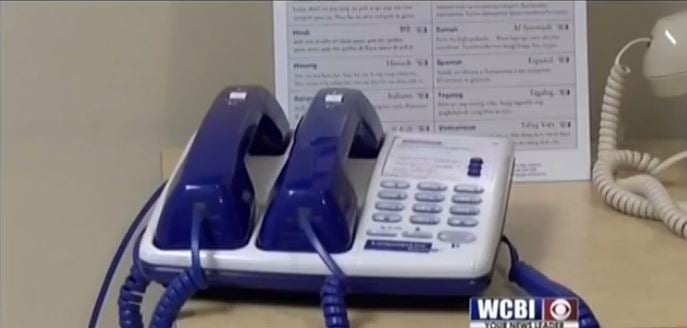Nearly half the residents of Lowndes County, Mississippi, are ethnic minorities, many of whom speak limited English.
For more than a decade, Baptist County Memorial Hospital has used a dual-handset phone to provide language access to patients who are not fluent in English.
Baptist has eight of the phones, which provide round-the-clock connections to LanguageLine’s® more than 20,000-plus professional interpreters. The patient holds one handset, the doctor holds the other, and the language interpreter is remote.
“We dial in, we select their language, and then we are able to (talk with the patient about) any questions, treatments, tell them what we are doing,” Nurse Manager Brandy Bryant told WCBI.
The hospital can access interpreters in more than 240 languages.
“We have the opportunity to minimize (language) barriers by communicating directly with the patient through the line,” Nurse Manager Ashley Chism said.
Patients can use this device to talk with doctors or nurses about any aspect of their care, including surgeries, medications, or pain they may be feeling.
“It increases their understanding and ( our) compliance. It allows us to continue to provide high-quality care to the patient,” Bryant said.
Health care organizations that receive federal funding like Medicare or Medicaid must comply with Section 1557 of the Affordable Care Act, which states that these entities must “take reasonable steps to provide meaningful language access to each individual with limited English proficiency (LEP).” Organizations that violate Section 1557 are out of compliance and potentially liable should an otherwise preventable breakdown in communication take place.
READ: What Does Meaningful Access Really Mean?
“The dual-handset phone is very quick, very easy to use. We’re able to say we are going to give you antibiotics now, or is your stomach hurting, or whatever it may be,” Chism said.
Bryant says it’s also helpful with younger patients.
“Even if the parents may speak some English, some of the children don’t. This is very beneficial in our ER and in our pediatric community,” Bryant said.
Chism says that “Baptist’s utilization of the dual-handset phone is a reflection of the hospital adapting to changes in the community they serve.”
“The time’s changing,” she said. “Being exposed to people with all different nationalities, it’s important for us to be able to communicate with everybody.”
About LanguageLine
LanguageLine has been the world leader in innovative language-access solutions since 1982. The company sets the global standard for phone, video, and onsite interpreting, as well as translation of the written word. LanguageLine is trusted by more than 30,000 clients to enable communication with the limited English proficient, Deaf, and Hard of Hearing communities. LanguageLine provides the industry’s fastest and most dependable access to more than 35,000 professional linguists in 290-plus languages — 24 hours a day, seven days a week, 365 days a year. Please do not hesitate to contact us.


